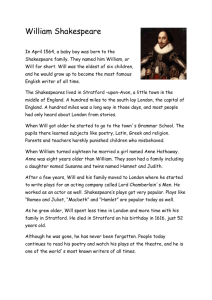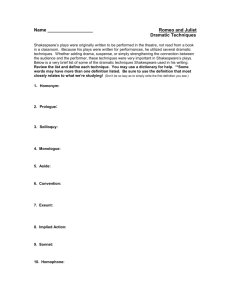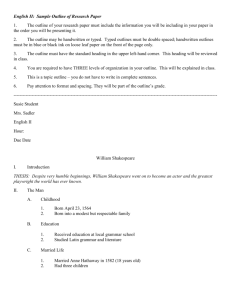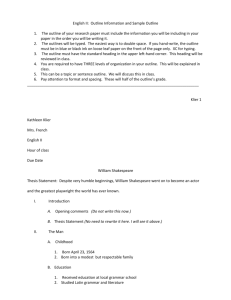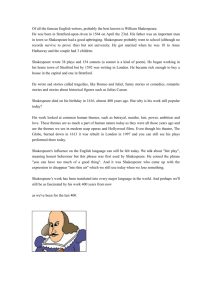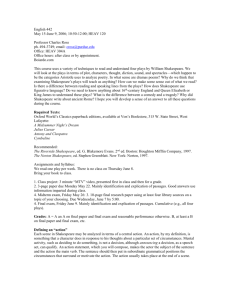Introduction to Shakespeare
advertisement
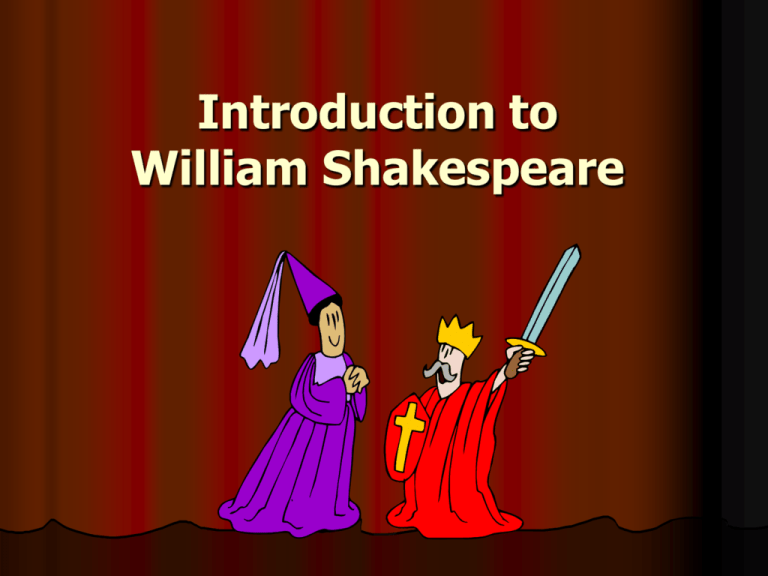
Introduction to William Shakespeare William Shakespeare Born 1564, died 1616 Wrote 37 plays Wrote over 150 sonnets Actor, poet, playwright Lived during the Renaissance, an era with an interest in individual achievement: Scientifically, geographically, commercially, philosophically, artistically Shakespeare’s Early Life 1564 He was born on April 23 in Stratford-on-Avon. His father, John, was a prosperous glove maker. He later became the mayor of Stratford. Mother was Mary Arden, who was from a socially prominent family. Both parents were illiterate Stratford Upon Avon A Young Man 1582 - He married Anne Hathaway. (He was 18 years old…she was 26) They had three children; Susanna and twins, Hamnet and Judith. Hamnet, his only son, died at age 11 1592, At age 28, Shakespeare left his family and headed to London. Not much is known about the years between his marriage and when he left for London Gaining Notoriety He performed as a member of Lord Chamberlain’s men, who mostly performed for royalty First gained status when he performed for Queen Elizabeth I She supported all arts: literature, painting, theater, music, sculpture By 1594 six of his plays were written and produced. His Death 1612 at age 48, Shakespeare returned to Stratford, in partial retirement. 1616, He died at the young age of 52. He is buried inside Stratford’s Holy Trinity Church. Publication 1616 Shakespeare died at the age of 52 after having written ____ plays 1623 Completed works were published 7 years after his death. This was known a the First Folio. Shakespeare wrote 3 types of Plays: 14 Comedies - light and amusing, usually with a happy ending 12 Tragedies –serious dramas with disastrous endings that chronicled the downfall of a tragic hero 11 Histories – plays that chronicled the lives of English monarchs Shakespearean Language Coined over 1000 words, many still in use today. Shakespeare wrote in blank verse, which is unrhymed iambic pentameter In order to maintain his meter, Shakespeare sometimes altered standard English in the following ways: • He sometimes changed grammar. • He sometimes inverted word order. • He sometimes omitted words or letters. Elizabethan Words to Know for Julius Caesar An,and: Aught: Anon: Aye: Beseech: But: Durst: E’en: E’er: Hie: Hither: If Anything Soon Yes Beg Only Dared Even Ever Hurry Here Notice A short form of “By the Virgin Mary”, a mild exclamation Prithee Pray thee, please Save: Except Soft: Wait a minute Thither: There Wherefore: Why Whither When Withal: Also Mark: Marry: The Globe Theatre • Open ceiling • No artificial lighting • • • Plays were shown during daylight hours only Three stories high Could seat 3000 people Spectators Wealthy people got to sit in the balcony The poor (called “groundlings”) had to stand and watch from the courtyard There was much more audience participation than today Actors Only men and boys Young boys whose voices had not changed played the women’s roles It would have been indecent for a woman to appear on stage Julius Caesar
